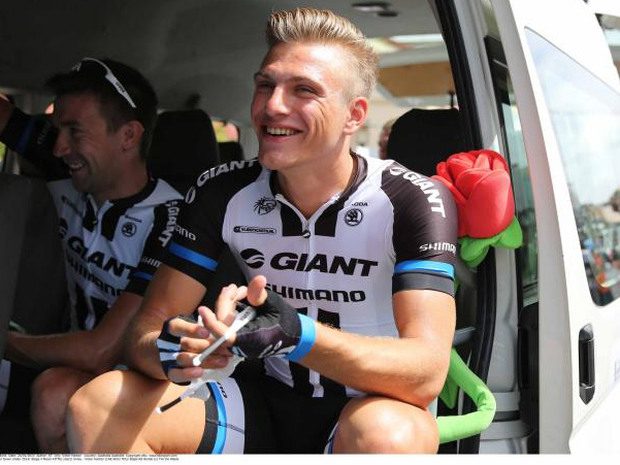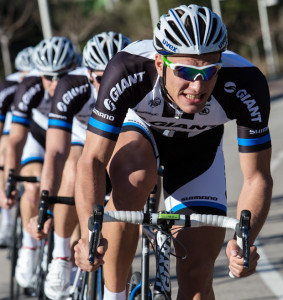Analysis: After Tour Dubai, is Kittel the new sprint king?

Marcel Kittel, Argos-Shimano’s star sprinter thundered to three consecutive stages wins at the recent Tour Dubai. En route to these victories he beat heavyweight sprinters Mark Cavendish and Peter Sagan. What is most remarkable about these wins, however, is that he beat each star on his own terrain: Stage 2 and 4 where flat and fast bunch sprints while Stage 3 included a hilly run-in to a finishing sprint (the type Sagan has dominated throughout the past two years). In this stage, Kittel fought hard to hang on to a group being lead by such stars as Alejandro Valverde, world road race champion Rui Costa and race leader Taylor Phinney only to surprise them all by emerging from the group with 100 m to go and crossing the line first.
Kittel’s coming of age
Kittel seems to be developing all the skills needed to dominate the sprinting world. There is no doubting his power in the final 200 m. His sprinting instincts were on full display at last year’s Tour de France where he won on four separate occasions. Many felt with the addition of sprinting veteran Alessandro Petacchi and lead-out man extraordinaire Mark Renshaw, Cavendish would have arm-chair rides to victories this season. That, so far, has proved false. At the Tour de Dubai, Cavendish’s Omega Pharma-QuickStep team lost him before the finish on two different occasions. In fact, it was Renshaw who sprinted to second place on the final stage.
Argos-Shimano team, in contrast, delivered their star Kittel to victory at each road stage in Dubai. They have also taken a much different approach to building their lead-out train. Instead of buying sprinting horsepower, the Dutch-based ProTour team developed their riders over the past few years and worked together to create cohesion and fluidity within the group. This organic process is proving to pay dividends. Kittel, at the conclusion of the last stage in Dubai, stated he lost his lead-out train with 2.5 km to go, but was able to rely on teammate Tom Veelers to return him to position. He reunited with his train and then sprinted to the win. This kind of co-ordination is only possible when teammates have a deep understanding of each others riding habits. His train is organized, disciplined and hungry for success.
But what about Cavendish?
Cavendish looked vulnerable at last year’s Tour de France for the first time since emerging as the world’s top sprinter in 2008 when he burst into the sprinting super stardom with a quadruple-stage win performance at that year’s Tour de France. Now the cycling world is waiting to see what 2014 will bring for the emotional rider. He has stated that one of his goals comes later: at the 2014 Tour de France’s first stage, which finishes in his mother’s hometown of Harrogate, England. Yet Cavendish is a true winner and to lose like he did at the Tour de Dubai—to a rider that got the better of him more than once last year—has to affect his confidence.
With the emergence of Kittel, has the Cavendish era of sprinting ended? It may be too early to write Cavendish off. He has, after all, won 25 stages at the Tour de France alone. Yet some of Cavendish’s sprinting power seems to be wearing out. He has reportedly decided upon a lighter racing schedule this year, preferring to arrive at his main targets more rested. On paper, he also has the best lead-out train in the pro peloton. But will these changes prove effective? Or has Cavendish finally come up against someone who quite simply can produce a faster sprint than him on a more regular basis? Only time will tell. However one thing is for sure: the Cavendish/Kittel sprint battle is far from over. Cavendish will not relinquish is sprinting crown without a fight. It seems Kittel will not stop until it is his.

